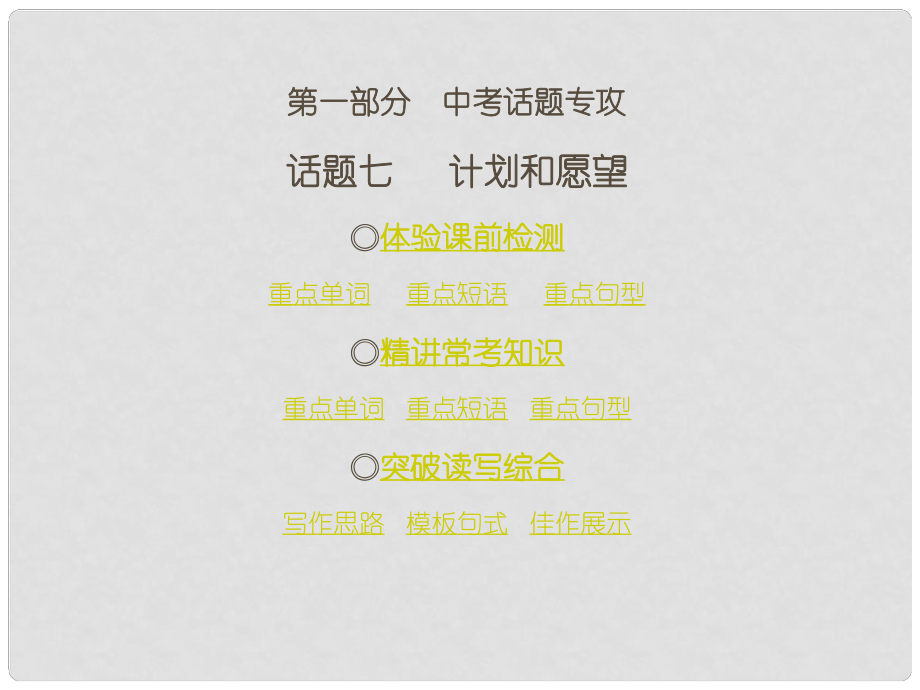《領(lǐng)跑中考(廣東專版)中考英語(yǔ) 話題七 計(jì)劃和愿望課件》由會(huì)員分享��,可在線閱讀����,更多相關(guān)《領(lǐng)跑中考(廣東專版)中考英語(yǔ) 話題七 計(jì)劃和愿望課件(28頁(yè)珍藏版)》請(qǐng)?jiān)谘b配圖網(wǎng)上搜索�。
1、第一部分第一部分 中考話題專攻中考話題專攻話題七話題七 計(jì)劃和愿望計(jì)劃和愿望體驗(yàn)課前檢測(cè)體驗(yàn)課前檢測(cè)重點(diǎn)單詞 重點(diǎn)短語(yǔ) 重點(diǎn)句型精講?�?贾R(shí)精講??贾R(shí)重點(diǎn)單詞 重點(diǎn)短語(yǔ) 重點(diǎn)句型突破讀寫綜合突破讀寫綜合寫作思路 模板句式 佳作展示重點(diǎn)單詞重點(diǎn)單詞重點(diǎn)單詞答案重點(diǎn)單詞答案 1. 已經(jīng);早已 2. 也���;而且3. 雖然����;盡管�����;即使 4. 總是 5. 另一����;又一 6. 足夠的,充足的,充分的; 足夠地,充足地,充分地7. 最后���;最終 8. 如果 9. 想象;設(shè)想 10. 立即11. intention 12. visit 13. education 14. send15. able 16. ques
2���、tion 17. improve 18. physical19. personal 20. relationship 重點(diǎn)短語(yǔ)重點(diǎn)短語(yǔ)重點(diǎn)短語(yǔ)答案重點(diǎn)短語(yǔ)答案1. At the beginning of 2. agree with3. have a lot in common 4. grow up 5. Write down6. am not sure about 7. Make sure 8. am able to 9. have to do with 10. takes up 重點(diǎn)句型重點(diǎn)句型重點(diǎn)句型答案重點(diǎn)句型答案1. What��;be�����; grow up 2. are you going
3���、to3. come true 4. Not everyone 重點(diǎn)單詞重點(diǎn)單詞1. if conj.如果。如果�����。if引導(dǎo)的條件狀語(yǔ)從句的謂語(yǔ)用一般現(xiàn)在時(shí)表示將要發(fā)生的動(dòng)作��。例:If you want to go to the movies with us, you need to ask for your mothers permission. 如果你想跟我們一起看電影��,你需要征得你媽媽的同意�。2. enough(1)adv.足夠���。修飾形容詞或副詞,通常放在形容詞或副詞的后邊�����。例:This house isnt big enough for us. 這房子對(duì)我們來(lái)說(shuō)不夠大�。(2)adj.足夠的
4、��。例:I didnt have enough clothes to last a week. 我的衣服不夠一周穿的�。3. imagine v.想象��,設(shè)想��。常見(jiàn)搭配:想象�����,設(shè)想����。常見(jiàn)搭配:imagine sth./sb.imagine sb./sth.(to be)+adj./n.imagine sb./sb.s doing sth.例:I had imagined the manager to be a handsome man.我本想象著經(jīng)理是一位很英俊的男人?�!炯磳W(xué)即練【即學(xué)即練】1. 完成句子Just imagine _ outside alone at deep night for t
5、wo hours.想象一下深夜里獨(dú)自一人站在外邊兩個(gè)小時(shí)��。Can you imagine him _ _ _ _ .你能想象他會(huì)如此滑稽嗎���?答案:答案:1. standing to be so funny 4. immediately (1)adv.立即��,立刻�。在句中作狀語(yǔ)�����。相當(dāng)于at once����,right away。例:She answered almost immediately. 她幾乎立刻就回答了��。(2)conj.一(就)����,引導(dǎo)時(shí)間狀語(yǔ)從句。相當(dāng)于as soon as��。例:Immediately shed gone, I remembered her name. 她剛走開我就想起了她的
6���、名字���。重點(diǎn)短語(yǔ)重點(diǎn)短語(yǔ)1. make sure確保確保, 確定�����;核實(shí)���。確定;核實(shí)�。例:I think that I have turned off the light, but I will go and make sure. 我想我把燈關(guān)了,但我會(huì)去核實(shí)一下。2. have to do with 與與有關(guān)系��。有關(guān)系�。常見(jiàn)的表示“與有關(guān)系”的結(jié)構(gòu): have sth. to do with. / be related to�����。例:He has a lot to do with this case. 他與這個(gè)案子大有關(guān)聯(lián)��。This problem is closely related to you
7��、r carelessness. 該問(wèn)題與你的粗心大意脫不了關(guān)系�����。3. take up (1)占據(jù)(時(shí)間或空間)。例:The table takes up too much room.這張桌子太占地方��。(2)拿起���,舉起����。例:She took up her bag and left.她拿起包離開了���?���!炯磳W(xué)即練【即學(xué)即練】2. 用take相關(guān)短語(yǔ)的適當(dāng)形式填空Someone has _ _ _my dictionary while I was out.David, _ _ the trash when you go outside.The little boy has big blue eyes.
8��、He _ _ his father.The plane is going to_ _. It will land in America答案:答案:2. has taken away take out takes after take off4. agree with (1)同意���,贊同�。例:He agreed with them about the need for change. 他同意他們需要變革的意見(jiàn)�����。(2)適合,適宜�����。例:I love strawberries, but they dont agree with me. 我喜歡草莓����,但吃了以后我會(huì)不舒服?����!局R(shí)鏈接】agree to 同意
9�、(觀點(diǎn)、看法等)agree on 就達(dá)成一致意見(jiàn)【即學(xué)即練【即學(xué)即練】3. 選詞填空:agree on/agree to/agree withAll my classmates _ _ what I said.My parents _ _ my decision.The two sides have _ _ the date of the meeting.Finally he _ _ our suggestion about the holiday.答案:答案:3. agreed with agreed to agreed on agreed to重點(diǎn)句型重點(diǎn)句型【即學(xué)即練【即學(xué)即練】4. 根
10����、據(jù)句意完成下列句子,每空一詞_ _bamboo grows tall. 并非所有的竹子都會(huì)長(zhǎng)得很高��。I dont want _the books. 我不是兩本書都要�。 _ _likes this book. 并非人人都喜歡這本書�。He is_ _so sad. 他并不是一直都這樣悲傷。I_ _completely. 我并不完全同意���。A foolish man make a mistake all the time. 笨人未必老是犯錯(cuò)誤����。答案:答案:4.Not all both Not everyone not always dont agree doesnt A信息歸納:請(qǐng)閱讀下面短文,并完成
11�、表格。信息歸納:請(qǐng)閱讀下面短文�����,并完成表格��。 Your junior school years are coming to an end. After this term, you will study in a senior school. What are you expecting from senior school? Lets hear what some teen readers think the future will be. B書面表達(dá)書面表達(dá) 最近��,你們班召開了以“我的中國(guó)夢(mèng)”為主題的班會(huì)活動(dòng)�����,每位同學(xué)都暢談了自己對(duì)中國(guó)夢(mèng)的理解�����。請(qǐng)寫一篇日記����,記述班會(huì)情況及自己的感受��。內(nèi)容
12����、要點(diǎn): 1談?wù)勛约旱膲?mèng)想���。 2為什么有這個(gè)夢(mèng)想��。 3如何實(shí)現(xiàn)自己的夢(mèng)想��。 Everyone talked about his understanding of the Chinese Dream. _【寫作思路寫作思路】 話題貼近生活實(shí)際����,讓學(xué)生有話可說(shuō)����。第一段,表達(dá)對(duì)中國(guó)夢(mèng)的理解���,然后確定自己的夢(mèng)想�����。時(shí)態(tài)應(yīng)為將來(lái)時(shí)態(tài)�。句型可以是 “I am going to do.”或者“My dream is to.”����;第二段,通過(guò)一個(gè)事例說(shuō)明你為什么有這個(gè)夢(mèng)想�。如果是以前的事例,要謹(jǐn)記用過(guò)去時(shí)態(tài)��;第三段����,討論如何實(shí)現(xiàn)自己的夢(mèng)想,用將來(lái)時(shí)態(tài)��?����!灸0寰涫侥0寰涫健?. I also talked about my own dream.2. My dream is to be a _(職業(yè)). Let me tell you why I have this dream.3. When I was years old. _(事例).4. In order to make my dream come true, first of all, I will _(做法).5. Whats more, I will _(做法).6. All in all, I believe Ill be a good.in the future.【佳作展示佳作展示】
 領(lǐng)跑中考(廣東專版)中考英語(yǔ) 話題七 計(jì)劃和愿望課件
領(lǐng)跑中考(廣東專版)中考英語(yǔ) 話題七 計(jì)劃和愿望課件

